- Home
- Elizabeth Strout
Olive, Again Page 9
Olive, Again Read online
Page 9
Ann said, “Do you remember that song, I think it’s a black spiritual—‘Sometimes I feel like a motherless child’?”
“ ‘A long way from home,’ ” Olive finished.
“Yeah, that one,” Ann said. Then Ann said, “But I always felt that way. And now I am.”
Olive considered this. “Well, I’m very sorry,” she said. Then she asked, “Where was she living when she died?”
“Outside of Cincinnati, where she always lived. Where I grew up, you know.”
Olive nodded. From the corner of her eye she watched this girl—this woman—and she thought, Who are you, Ann? She knew the girl had a brother somewhere, but what was his story? She couldn’t remember, she only knew they had no contact, was he on drugs? He might have been. The mother had been a drinker, Olive knew that. And her father had divorced the mother years ago; he’d been dead for a long time. She said again, “Well, awful sorry.”
“Thanks.” Ann stood up—remarkably easily, considering she was holding the baby—and then she walked away. She just walked away! It took Olive many moments to stand up, she had to heave herself onto one arm and roll herself a bit to get her foot under her.
“Oh, honest to God,” she said. She was panting by the time she got back to the car.
* * *
On the way back, Olive said, “Chris, why didn’t you tell me Ann’s mother died?”
He made a sound and shrugged.
“But why wouldn’t you tell me such a thing?” Through the window were the trees still bare, their limbs dark, poking toward the sky. They passed by a field that looked soggy and matted down in parts, the streaming sun showing it all.
“Oh, her mother was nuts. Whatever.”
In the backseat Henry sang out, “Goggie, goggie. Train, airplane! Daddy, Mama!” Olive turned to look at him, and he smiled at her.
“He’s just singing all the words he knows,” Christopher said. “He likes to do that.”
“But I don’t understand,” Olive said, after waving to Little Henry. “I just don’t, Christopher. She’s my daughter-in-law, and I’d like to know what’s going on in her life.”
Christopher glanced at her quickly, then back at the road; he drove with one arm draped across the wheel. “I really didn’t know you cared,” he said. He looked over at her again. “What?” he asked.
Olive had started to ask a question. “Why—?”
“I just told you why.”
And Olive nodded. Her question, which she did not ask, was: Why did you marry this woman?
* * *
They made it through another night, and one more day, and then the final night arrived. Olive was exhausted. In the entire time, except for Little Henry, the children did not speak to her. But they stared at her—with increasing boldness, she thought—because whenever she looked at them they were looking at her, and instead of glancing down as they had at first they continued to stare, Theodore with his huge blue eyes, and Annabelle with her small dark ones. Unbelievable children.
Finally they went off to bed in the study and Olive sat with Christopher and Ann and the baby while Little Henry—such a good boy!—was asleep upstairs. Olive was getting used to the breast being stuck out in the open now, she didn’t like it, but she was getting used to it. And she felt sorry for Ann, who seemed to her to be diminished in her grief. So she made small talk with the woman and Ann seemed to try to do her best as well. Ann said, “Annabelle wanted those rubber boots because we were going to Maine. Isn’t that sweet?” And Olive, who could not think what to say about this, nodded. Ann eventually went upstairs with the baby, and then Olive was alone with Christopher, and she realized the moment had come.
“Christopher.” She forced herself to look at him, although he was looking down at his foot. “I’m getting married.”
It seemed forever before he looked at her and said, with half a smile, “Wait. What did you just say?”
“I said I’m getting married. To Jack Kennison.”
She saw the color leave his face; without a doubt his face became pale. He looked around the room for a moment, then turned to look at her. “Who the fuck is Jack Kennison?”
“He lost his wife a while ago. I’ve mentioned him on the phone to you, Chris.” She felt as though her face was flaming hot, as though all the blood that had drained from her son’s face had made its way to her face instead.
He looked at her with such genuine astonishment, she felt she would take it back immediately, the whole thing, if she could. “You’re getting married?” His voice was quiet now. In a quieter voice he said, “Mommy. You’re getting married?”
Olive nodded quickly. “I am, Chris.”
He kept shaking his head in small gestures, slowly, just kept shaking it and shaking it. “I don’t understand. I don’t get this, Mom. Why are you getting married?”
“Because we’re two lonely old people and we want to be together.”
“Then be together! But why get married? Mom?”
“Chris, what difference does it make?”
He leaned forward and said—his voice sounded almost menacing—“If it doesn’t make any difference, then why are you doing it?”
“I meant, to you. What difference does it make to you?” But horribly, Olive now felt a niggling of doubt. Why was she marrying Jack? What difference did it make?
Christopher said, “Mom, you invited us up here just to tell us that, didn’t you. I can’t believe it.”
“I invited you up here because I wanted to see you. I haven’t seen you since your father’s funeral.”
Christopher was looking at her hard. “You invited us up here to tell us you were getting married. Unfuckingbelievable.” Then he said, “Mom, you have never invited us up here.”
“I didn’t need to invite you, Chris. You’re my son. This is your home.”
And then the color returned to his face. “This is not my home,” he said, looking around. “Oh my God.” He shook his head slowly. “Oh my God.” He stood up. “That’s why it looks so different. You’re moving out. Are you going to move into his house? Of course you are. And sell this one? Oh my God, Mom.” He turned to look at her. “When are you getting married?”
“Soon,” she said.
“Is there going to be a wedding?”
“No wedding,” she said. “We’ll go to Town Hall.”
He walked to the stairs. “Good night,” he said.
“Chris!”
He turned.
Olive stood up. “Your language is deplorable. You said at your father’s funeral that the man never swore.”
Christopher stared at her. “Mom, you’re killing me,” he said.
“Well, Jack is coming over in the morning to meet you before you all leave.” She was suddenly furious. “Good night,” she said.
* * *
—
She could hear—almost immediately—Christopher and Ann talking; she could not hear what they said, she was sitting in the living room, but the sound of their voices came to her steadily. Finally she rose and slowly, very quietly, went and stood by the stairs. “Always been a narcissist, Chris, you know that.” And then Chris answered, “But Jesus Christ,” and something more, and Olive turned and went just as slowly and quietly back to her chair in the living room.
In her room later that night she kept thinking about the word “narcissist,” which she knew the meaning of naturally, but did she really know the meaning? She looked at her computer, finding the word “narcissism” in the dictionary. “Self-admiration,” it said, then, “personality disorder.” She closed the computer. Olive didn’t understand this, she really didn’t. Self-admiration? Olive felt no admiration of herself! Personality disorder? Given the extensive and widespread array of human emotions, why was anything a personality disorder? And who came up with such a term? People like that crackpot
therapist Ann and Christopher had been seeing years ago in New York. Well, that therapist had a disorder; he was crazy.
She got into bed and she did not expect to sleep, and she did not sleep. She took from her bedside drawer the little transistor radio she had held on to while she slept—or tried to—for so many nights of her later life, and she turned it on low and held it to her ear, lying with it that way. The entire night went by and she stared at the dark, turning only a few times. She watched the red digital clock, and she clung to her little transistor radio, but she heard every word that came from it and understood that she had not even dozed.
When it was light she got up and got dressed and went downstairs. She put three bowls of Cheerios and the milk on the table. Glancing in the small mirror by the doorway she saw that she had the reddened-eye look of a prisoner.
“Hi, Mom,” said Christopher, appearing in the kitchen. “What time is he coming over? Because we have a long drive.”
“I’ll call him right now,” said Olive, and she did. “Hello, Jack,” she said, “can you come over now? They have a long drive and want to get started. Wonderful. See you soon.” She hung up.
“Oh, kids, look what Grandma did.” Ann came in holding the baby. “She got your cereal out.” The children did not look at her—Olive noticed—but sat down, Theodore and Annabelle balanced together on one chair, and ate their cereal. They made terrible smacking sounds. Little Henry put his spoon on the table and banged it hard, then smiled at Olive as milk and Cheerios sprayed through the air. “Henry,” murmured Ann. And Henry said, “Airplane!” And took the spoon and rode it through the air.
* * *
—
As soon as Olive saw Jack’s car pulling into the driveway she realized that Jack—of course—was driving his sports car, and she hoped Christopher didn’t see it. When Jack knocked on the door, and she let him in, she saw that he was wearing his suede coat, and she thought he looked rich, and sly. But he had the sense not to kiss her. “Jack,” she said. “Hello. Come and meet my son. And his wife,” she added. And then added, “And their kids.”
Jack gave a small bow in his ironical way, his eyes twinkling as they often did, and he followed her into the living room. “Hello, Christopher,” he said, and he held out his hand. Christopher rose slowly from his chair and said, “Hello.” He shook Jack’s hand as though it was a dead fish he had been offered.
“Oh, come on now, Chris.” The words were out of Olive’s mouth before she realized what she had done.
Christopher looked at her with open surprise. “Come on?” He said this loudly. “Come on? Jesus, Mom. What do you mean, ‘Oh, come on now, Chris’?”
“I just meant—” And Olive understood that she had been frightened of her son for years.
“Oh, stop it, Christopher! Stop it, for Christ’s sake!” This was Ann’s voice; she had walked into the room after Olive, and Olive, turning toward her, was amazed to see that Ann’s face was red, her lips seemed bigger, her eyes seemed bigger, and she said, again, “Stop it, Chris. Just stop it! Let the woman get married. What’s the matter with you? Jesus! You can’t even be polite to him? For crying out loud, Christopher, you are such a baby! You think I have four little kids? I have five little kids!”
Then Ann turned toward Jack and Olive and said, “On behalf of my husband, I would like to apologize for his unbelievably childish behavior. He can be so childish, and this is childish, Christopher. Jesus Christ, is this childish of you.”
Almost immediately Christopher held up his hands and said, “She’s right, she’s right, I am being childish, and I’m sorry. Jack, let’s start again. How are you?” And Christopher put his hand out once again toward Jack, and Jack shook it. But Christopher’s face was as pale as paper, and Olive felt—in her utter bewilderment—a terrible pity for him, her son, who had just been so openly yelled at by his wife.
Jack waved a hand casually and said something about it being no problem, he was sure it was a shock, and he sat down and Christopher sat down and Ann left the room, and Olive stood there. She only barely heard as her son asked Jack—who was still wearing his suede coat—what he had done for work, and she only barely heard Jack say he had taught at Harvard his whole life, his subject had been the Austro-Hungarian Empire, and Christopher nodded and said, Cool, that’s cool. Ann walked back and forth with the children’s things, gathering up all their belongings, the children stood in the doorway watching, sometimes going to their mother, and she shook them off. “Move!” she yelled at one of them. Little Henry stood in the doorway of the living room and began to cry.
Olive went to him. “Now, now,” she said. He ran his hand over his wet eyes and looked up at her. Then—and Olive was never sure this really happened, for the rest of her life she didn’t know if she imagined it—he stuck his tongue out at her. “Okay,” said Olive, “okay, then,” and she moved back into the living room, where Jack and Christopher were now standing, finishing their talk.
“All set?” Christopher asked Ann as she passed through the room once more with a wheelie suitcase. Then he turned to Jack. “Very nice to have met you, if you’ll excuse me, I have to help my wife get our brood together.”
“Oh, of course.” And Jack bowed again in his ironical way. He stepped back and put his hands into the pockets of his khaki pants, and then he took them out again.
Olive was dazed as they got all their things together, their coats on, the shoes, the blue rubber boots; Ann’s expression remained stony, and Christopher was obsequious in his attempts to be helpful to her. Finally they were ready to leave, and Olive put her own coat on so she could walk them to the car. Jack walked them out as well, and Olive saw her son speak to Jack once more by the passenger side—Ann was to drive—and her son seemed open-faced, and even had a smile as he spoke to Jack. The kids were all buckled in, and then Chris walked to Olive and gave her a half hug, almost not touching her, and said, “Bye, Mom,” and Olive said, “Goodbye, Chris,” and then Ann gave her a hug too, not much of one, and Ann said, “Thanks, Olive.”
And then they drove away.
* * *
It wasn’t until Olive saw the red scarf that she had knit for Little Henry lying half under the couch in the living room that she felt something close to terror. She bent down and picked it up, and she took the scarf and returned to the kitchen, where Jack was leaning forward with his arms on the tabletop. Olive opened the door and put the scarf into the garbage bin by the front door. Then she came back inside and sat down across from Jack. “Well,” she said.
“Well,” Jack said. He said it kindly. He placed his large, age-spotted hand over Olive’s own. In a moment he added, “I guess we know who wears the pants in that family.”
“Her mother died recently,” Olive said. “She’s grieving.”
But she pulled her hand away. It came to her then with a horrible whoosh of the crescendo of truth: She had failed on a colossal level. She must have been failing for years and not realized it. She did not have a family as other people did. Other people had their children come and stay and they talked and laughed and the grandchildren sat on the laps of their grandmothers, and they went places and did things, ate meals together, kissed when they parted. Olive had images of this happening in many homes; her friend Edith, for example, before she had moved to that place for old people, her kids would come and stay. Surely they had a better time than what had just happened here. And it had not happened out of the blue. She could not understand what it was about her, but it was about her that had caused this to happen. And it had to have been there for years, maybe all of her life, how would she know? As she sat across from Jack—stunned—she felt as though she had lived her life as though blind.
“Jack?”
“Yes, Olive?”
She shook her head. What she would not tell Jack was the alarm she had felt when she saw Ann yell at her son, and what came to her as she sat here now was the fac
t that it had not been the first time Ann had yelled at him like that; these were openings into the darkness of a relationship one saw by mistake, as if inside a dark barn, the door had been momentarily blown off and one saw things not meant to be seen—
But it was more than that.
She had done what Ann had done. She had yelled at Henry in front of people. She could not remember who, exactly, but she had always been fierce when she felt like it. So there was this: Her son had married his mother, as all men—in some form or other—eventually do.
Jack spoke quietly. “Hey, Olive. Let’s get you out of here for a while. Let’s take a drive, then come to my place. You need a break from being here.”
“Good idea.” Olive stood and went and got her coat and her big black handbag and she let Jack walk her out to the Subaru. He helped her in, and then got in himself, and they drove away. Olive almost looked back behind her, but she closed her eyes instead: She could see it perfectly anyway. Her house, the house she and Henry had built so many years ago, the house that looked small now and would be razed to the ground by whoever bought it, the property was what mattered. But she saw behind her closed eyes the house, and inside her was a shiver that went through her bones. The house where she had raised her son—never, ever realizing that she herself had been raising a motherless child, now a long, long way from home.
Helped
It was not until the Larkin house burned to the ground that people found out Louise Larkin was not living there anymore. The newspaper said she was in the Golden Bridge Rest Home. “That means she’s gone completely dopey-dope,” Olive Kitteridge said to Jack Kennison as she looked up from the paper. “But my word, what a sad thing about her husband.” Louise Larkin’s husband had died in the fire; apparently he had lived only in the upstairs of the house, and the fire had started in the kitchen. It was drug-related, according to the newspaper that Olive was reading. The headline said: 83-Year-Old Man Dies in House Fire: Drug Users Suspected.

 The Best American Short Stories 2013
The Best American Short Stories 2013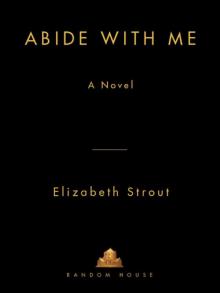 Abide With Me
Abide With Me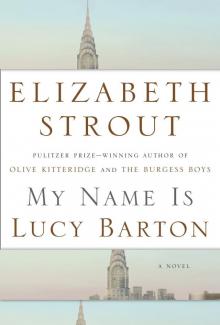 My Name Is Lucy Barton
My Name Is Lucy Barton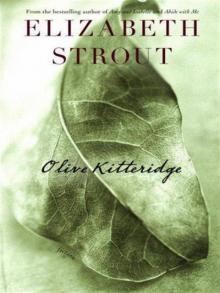 Olive Kitteridge
Olive Kitteridge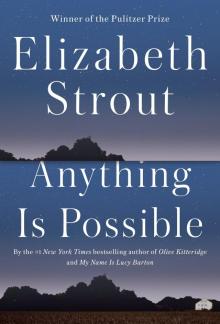 Anything Is Possible
Anything Is Possible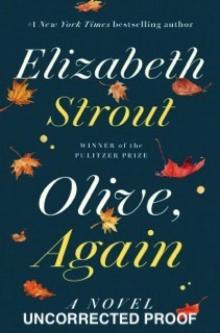 Olive, Again (ARC)
Olive, Again (ARC)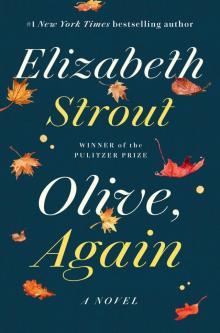 Olive, Again
Olive, Again